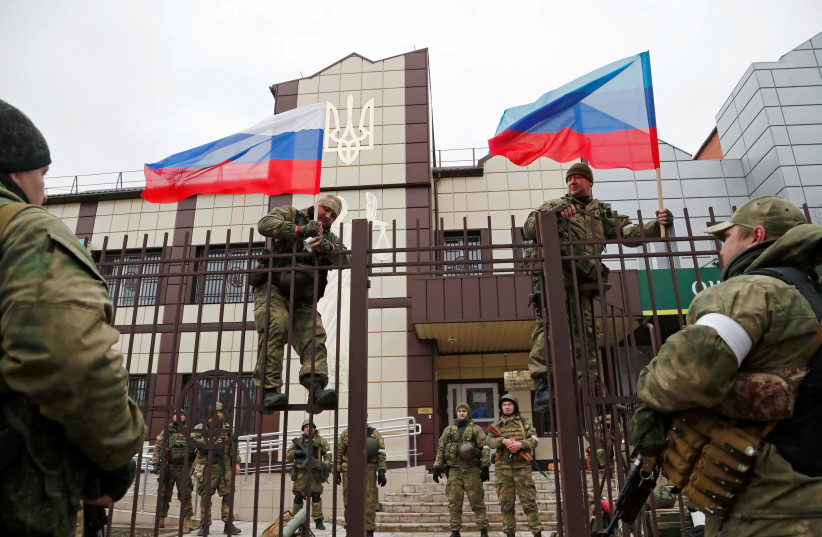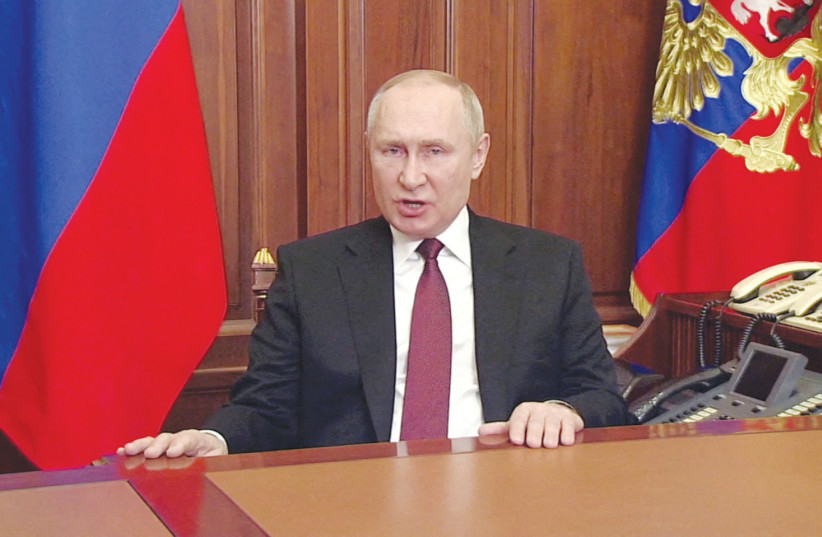Many of Washington’s Arab allies remain mum on the Russia-Ukraine conflict, opting to stay neutral in their statements and calling for an end to violence and to respect the sovereignty of all countries while urging “self-restraint.”
For more stories from The Media Line go to themedialine.org
On Monday, the Arab League’s Council, at the level of permanent delegates, expressed concern over the events in Ukraine and declared its support for “all efforts aimed at resolving the crisis through dialogue and diplomacy, in a manner that preserves the security and safety of peoples in this important region of the world.”
The Egyptian Foreign Ministry issued a statement saying Cairo was “following with great concern the successive developments in connection with the situation in Ukraine.”
Egypt, the statement continued, stressed “the importance of giving priority to the language of dialogue and diplomatic solutions, and endeavors that would speed up the political settlement of the crisis in a manner that preserves international security and stability, and in a manner that ensures that the situation does not escalate or deteriorate, and in order to avoid the aggravation of the humanitarian and economic situation and its impact on the region and the world.”
The Jordanian Foreign Ministry issued a statement affirming that it was “following with concern the developments of the situation in Ukraine and the rise in tension there,” and stressing “the importance of the international community and all concerned parties continuing to exert maximum efforts for restraint, de-escalation, settling the conflict by peaceful means, and restoring security and stability in the region through dialogue.”

Except for Damascus and Tripoli, Arab capitals remained silent or issued generic statements calling for self-restraint and an end to the Russo-Ukrainian clash.
Many analysts say that Arab governments prefer, at least for now, to distance themselves from the escalating tensions, out of a desire to preserve their relations with the two parties chiefly involved in the conflict, Russia and the West.
However, a few have taken sides.
The Libyan government affirmed its commitment to Ukraine’s sovereignty and territorial integrity, according to a statement by the Foreign Ministry.
And Syria’s president, Russia’s closest ally, issued a statement in support of President Vladimir Putin’s position regarding Ukraine.
In a phone conversation with Putin, President Bashar Assad described the Russian offensive as a “correction of history.”
“His Excellency [Assad] stressed that Syria stands with the Russian Federation, based on its conviction of the correctness of its position,” the statement said.
Syria was one of the first countries to recognize two breakaway regions in eastern Ukraine that Putin has said he was seeking to protect via a “special military operation.”
The Libyan Foreign Ministry, meanwhile, renewed its rejection of the “illegal presence” of the Russian Wagner Group’s forces in both Ukraine and Libya.
Russia plays a role in the Libyan civil war by arming the Tobruk-based Libyan National Army led by General Khalifa Haftar, and through the Wagner paramilitary group that is deployed in the oil-rich country.
Many Arab countries depend on importing Russian or Ukrainian wheat to meet their needs, such as Yemen, Lebanon, Libya, Egypt, Tunisia, and Algeria, all of which are experiencing living standards crises.
Oraib al-Rantawi, the founder and director of the Al Quds Center for Political Studies in Amman, told The Media Line there was “no doubt that there is an embarrassment and faltering positions from these countries.
“Most of the Arab countries are in a state of embarrassment in the Ukrainian crisis, while there are countries that have decided their position on the matter,” he said.
Rantawi said Jordan expressed a position that respected the unity and sovereignty of states and called for a political and diplomatic solution and restraint. But he added that Amman needed Moscow’s cooperation to help control the Syria-Jordan border and considered open dialogue between Jordan and Russia to be vitally important.
“In the end, Amman cannot veer off too much from the American position, even though it has a relationship and common interests with Russia, especially in Syria. The situation is critical for Jordan, and Amman hopes that Washington will understand its sensitive position,” he says.
Many US allies in the Gulf and Egypt are feeling embarrassed now, as “they maintain strategic relations with the United States, from which they receive financial and military support, and need the United States in their security and defense strategy. And America is one of the largest trade markets for these countries,” says Rantawi.
He argues that their position has to shift toward that of the Americans and Europeans.
“With the European-American position crystallizing through harsh economic sanctions, these countries feel that they must resolve their position and take a certain and obvious one, especially after [President Joe] Biden’s statements in which he called on countries to abandon neutrality,” Rantawi says.
Fahad al-Shelaimi, president of the Middle East Center for Strategic and Political Studies in Kuwait, told The Media Line the Gulf states have chosen to stay neutral for now.
“The position of the GCC countries in general, and Kuwait in particular, requires impartiality and adherence to international law. This is the only way,” he says. “Yes, there is diplomatic silence, but they speak in general about respect for the sovereignty of states and adherence to international and humanitarian law.”
Shelaimi says that even the Gulf-financed media are meticulously careful in choosing their words when reporting on the conflict.
“The Gulf states have good relations with both sides. They have economic interests with both sides, although their interests are with Europe and America more than with Russia.”
Shelaimi says the Gulf states are concerned by the Russia-Ukraine escalation, but he argues that it is the previous positions of the European and the current US administration that are to blame for the GCC’s stance.
“They are hesitant and there’s no enthusiasm because the Gulf countries do not have full confidence in the American Democratic administration, or in the European administrations, especially in negotiations over the Iranian nuclear program.”
It is no secret that the European and American role in the Middle East is receding, and that Washington is shifting its focus elsewhere. That, he says, has Gulf capitals worried.
“Experience has taught us that in many cases enemies become friends overnight. There are diplomatic negotiations underway, and the Gulf states do not want to take sides,” says Shelaimi.
The Russian arms trade with many Arab countries will undoubtedly play a decisive role in the positions of these governments.
Russia doubled its weapons exports to Algeria, maintaining its position as the largest supplier to the Algerian army whose annual budget for armaments amounts to about $10 billion.
Moscow supplies other Arab states with weapons including Iraq, Egypt, and Saudi Arabia.

The US puts too many restrictions on selling weapons to nondemocratic regimes with human rights violations, prompting some Arab countries to look to Moscow. Russia does not place such conditions on its arms exports, which makes it a tempting resource for regimes that are subject to widespread accusations of human rights abuses.
The war in Yemen has pushed Saudi Arabia and the United Arab Emirates to sign arms deals with Moscow because the US and European governments are concerned that weapons they sold to Riyadh are being used indiscriminately against civilians.
The US and Europe “tend to want a settlement” in Yemen, says Shelaimi, something that evokes skepticism in many of the Gulf states.
“Therefore, these countries don’t want to burn their bridges with countries such as Russia and China. Experience has taught us that European and American positions are changeable,” Shelaimi says.
